Discover Fuel Consumption Tips: How Much Gas Does a Pontoon Boat Use?
I’m guessing this is your first pontoon boat – congratulations!
Now you’re probably wondering about gas consumption for boats. And specifically, how much gas does a tritoon with a Yamaha outboard motor of 50 hp consume?
Here’s the general guideline: a vessel burns roughly eight gallons per hour for every 50 hp.
However, if you would like to make it more accurate you can use your mileage per gallon rating (mpg) to estimate depending on how economical or thirsty your boat is in terms of fuel consumption.
Typically, a tritoon such as Bennington with 50 horsepower Yamaha outboard motor will require around three gallons per hour which gives an average of about three miles per gallon (mpg).
If you want to burn less fuel in an hour then maybe go for an engine that has good fuel economy.
For instance; a 115 horsepower Mercury outboard motor may consume as little as eight gallons per hour thereby giving closer to three miles per gallon (mpg).
To improve your boats MPG you could also follow these tips such as keeping the engine tuned up so that it runs efficiently and ensuring clean fuel is used by filling up from reliable sources.
Understanding Pontoon Boat Fuel Consumption
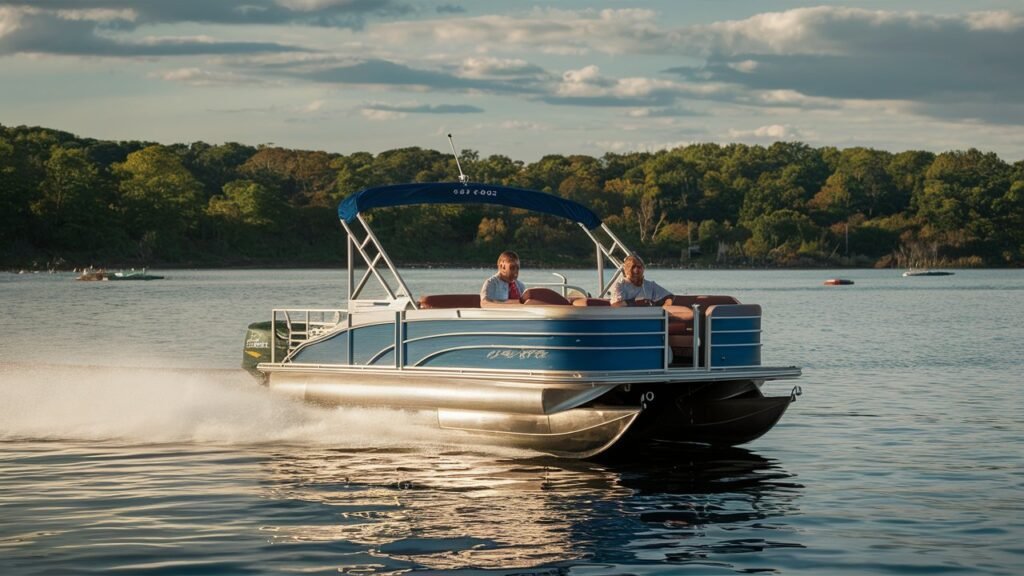
Understanding Pontoon Boat Fuel Consumption
So, you want to know how much gas your boat burns.?
You aren’t alone. Many people turn to fishing forums for help with this question. It only makes sense; you need to know how far a tank of gas will take you when you’re cruising around the lake.
On average, fuel consumption for pontoon boats is between 5-8 gallons per hour depending on the size of the boat engine and horsepower used.
If your new boat has a top speed of about 20-30 miles per hour, expect to use around 5-6 gallons an hour; that’s not bad at all – about 2 miles per gallon.
Fuel mileage may be different with center console boats. They could use up to 8 gallons per hour with a top speed of 25 mph.
This could get expensive if using diesel fuel…you might burn through an average of 3.6 gallons every single hour; keep in mind this is higher than regular boat gas!
Before filling her up down at your local station though, consider how many liters are in your tanks and what she’ll drink on a day out!
Pontoon Boat Fuel Efficiency
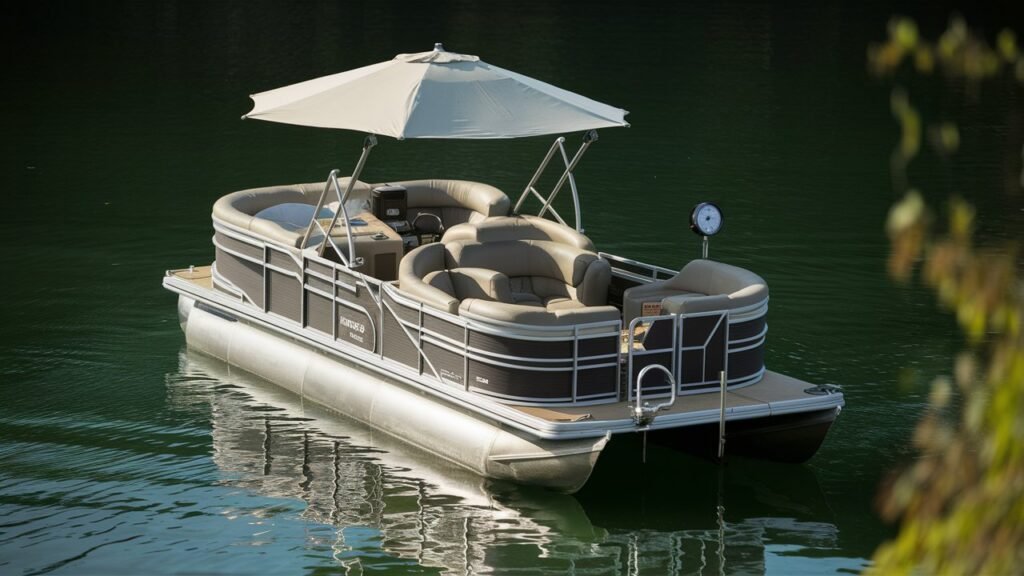
So, Fuel Efficiency of Pontoon Boats – let’s get to it. For instance, a standard pontoon boat could consume about four gallons of fuel in one hour.
In other words, if your speed is between 20 and 30 mph on average then you’re looking at around five gallons an hour which is equivalent to sipping through twelve gallons out of a tank for the whole day!
But guess what? If you are lucky enough to own a fuel injected model with good tuning on its system then this number can drop down as low as twenty-five GPH or higher than two times the average boats horse power at four MPG per HP.
It all comes down to knowing when enough is enough; find that spot where fun meets frugal!
Fuel Consumption Factors
Regarding fuel consumption factors, you must consider various things.
Initially, you should contemplate the amount of fuel that is being consumed by you.
This can really add up if an engine burns through 6 gallons every hour!
If it is only burning 5 gallons in sixty minutes, well then that’s a little more friendly on your wallet.
However, it also means how much all those fuels weigh on the plane. So remember these points while filling her up next time!
Tips for Optimizing Fuel Usage
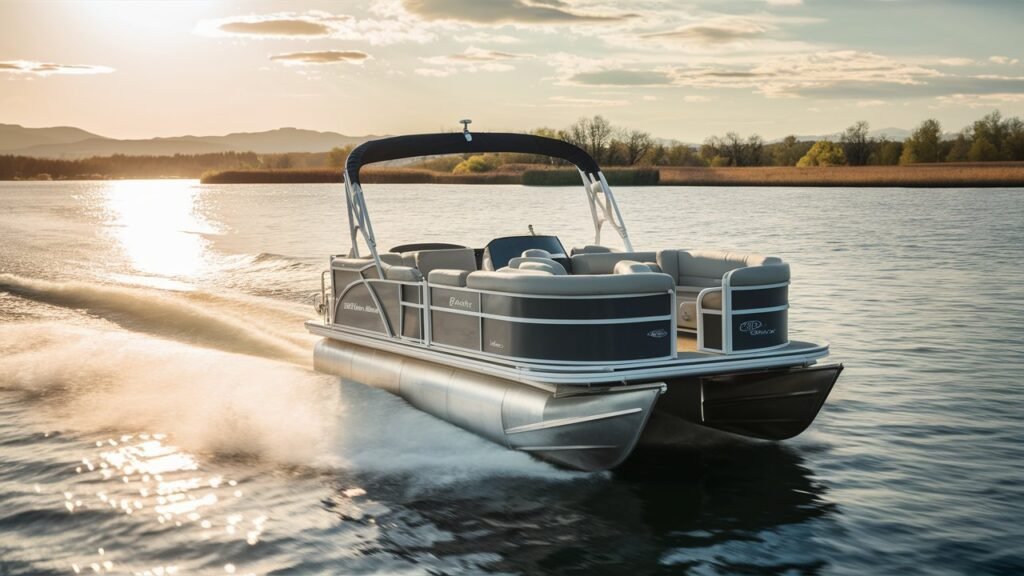
Alright, this is what you need to know about how to maximize the usage of your fuel.
To start with, ensure that you monitor your gph (gallons per hour) consumption.
This will give you a rough estimate on how economical your vehicle burns gas. Another hint is to stay away from fast starts and hard stops as they can really gulp down fuel.
Also, try to maintain a constant speed while driving on the freeway – continuous accelerating and slowing down may consume much fuel.
Finally, make sure that you frequently service your automobile with regular tune-ups for it to achieve its best mileage. Follow these pointers and before long you will save money on petrol!
Cruising Speed and Gas Consumption
When you are driving at a constant speed, it’s called cruising. You’re not going too fast or too slow – just fast enough.
The best thing about this is that your petrol consumption becomes optimal.
You don’t burn it like mad but also do not crawl along like a turtle. So it’s all about the equilibrium here, if you get what I mean!
Choosing the Right Fuel Type
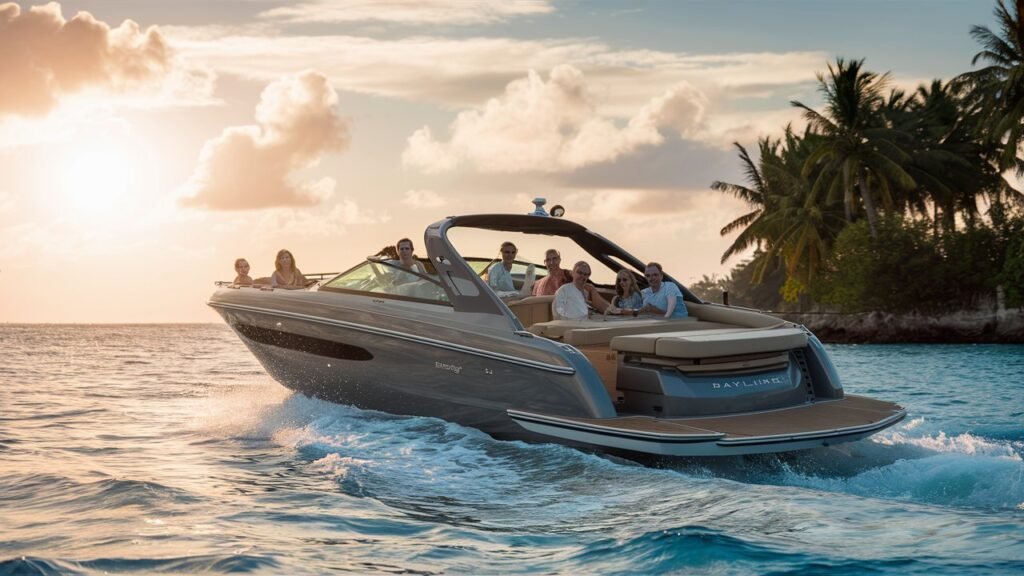
Considering the appropriate fuel type for your vehicle involves several things.
Initially, you want to ponder over what is convenient. Do you live near a gas station with regular unleaded? Or do you have to drive far for premium unleaded?
The second thing is to think about the needs of your car.
Check out what is suggested in your owner’s manual for best performance.
Finally, consider the price. Diesel may cost more at first but it could save you in the end because it has higher fuel efficiency. So think twice before deciding!
Factors Influencing Gas Consumption
So, as it turns out, there are various factors that can affect the amount of petrol cars consume.
The first thing is driving.
If you race through the streets like Lewis Hamilton, you will use up all your fuel before someone cruising at a fixed speed does.
Secondly, it depends on the car itself.
I mean some big trucks drink like sailors compared to small compact cars.
Lastly but not least, tire pressure and air conditioning units also affect gas mileage though this may not be obvious.
Effect of Horsepower on Fuel Burn
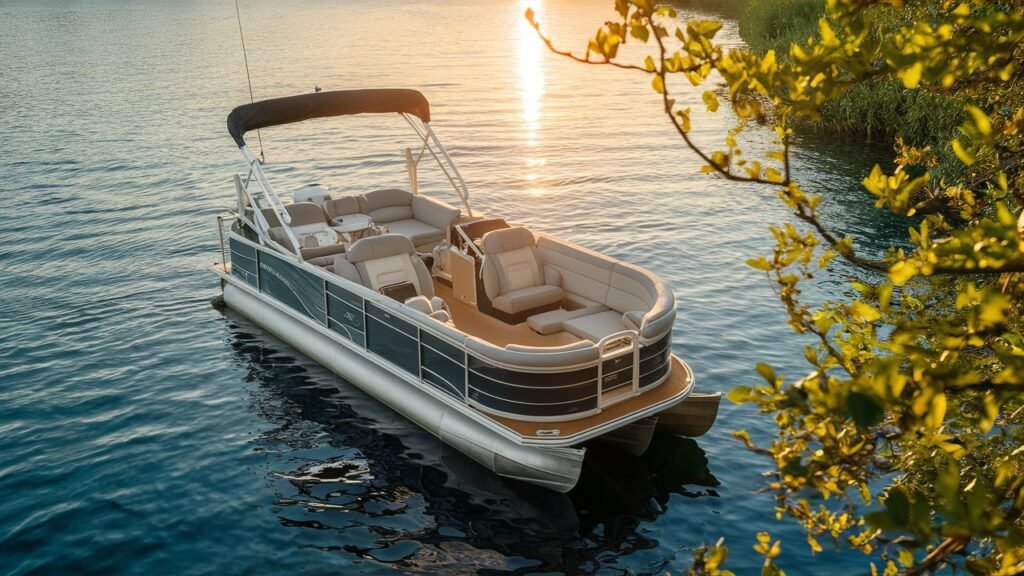
So, you know how horsepower is about the energy released by your car’s engine? Right?
Well, it also determines the amount of fuel you will burn.
The higher the horsepower in your vehicle; the more gas it’s going to consume.
I mean having a very strong motor is nice but you should be ready to visit petrol stations more frequently don’t you think?
Therefore if all what you care about is speed and performance just know that it will require additional expenses on petrol.
Nevertheless yeah! It’s absolutely necessary for those exciting adventures.
Boat Weight and Gas Efficiency
So, bro, when you talk about the weight of a boat and its fuel consumption, what is important to keep in mind is how much power your engine can handle.
You don’t want to overwork it. You know?
Watch out for the RPM gauge; make sure you don’t work on too high revs for too long.
Also if you’re carrying lots of equipment or extra people that will increase the overall weight of your vessel so just keep that in mind.
But yeah in the end cruising at a constant speed is the best way to save gas and have a good time on the lake.
Tank Capacity and How it Affects Fuel Consumption
Alright, let’s talk about different types of boats and their fuel consumption in relation to tank capacity.
To start, we have the fishing boat. They tend to have smaller tanks as they don’t usually travel far, resulting in less fuel being used; this is a good thing.
After that comes the deck boat. These boats are great for parties on the water – they often have bigger tanks so people can have more fun!
Then there’s the bass boat that is perfect for early morning fishing trips.
With a smaller tank you won’t break the bank filling her up. So choose wisely depending on what you need and how much money you’ve got!
Maximizing Fuel Efficiency with the Right Tank Size
Hello! So, you need to ensure that your vehicle is achieving greatest fuel efficiency, don’t you?
Then one of the ways to do so is ensuring that you choose the right tank size for your car.
If a large tank that’s never needed at all times is being filled up by you, then, it follows that more gas will be wasted as unnecessary weight is carried around.
Don’t go for over-sized tanks when most of your trips are within town.
Use a tank size proportionate to how you drive; this way not only will money be saved on gas stations but also environmental pollution reduced.
Calculating Fuel Consumption for a Full Tank
Like if you are to know the miles per gallon (MPG) of your car, then you must calculate the fuel consumption for a full tank, right?
Initially, ensure that your tank is completely filled and record the reading on your odometer.
Drive around until all the gasoline is consumed, noting down this second mileage too.
Then subtract first mileage from second which gives total number of miles travelled.
Finally divide the total number of miles travelled by number of gallons used in refilling the tank.
conclusion
In the end, knowing how fuel is used on pontoon boats can help owners make the most out of their time on the water and save money.
Understanding the things that affect fuel usage like power, velocity and tank size among others will enable boat owners to make appropriate choices for maximum fuel economy.
Further more, following such suggestions as keeping a consistent speed; not accelerating or braking too quickly; doing regular engine check-ups etc., may cut down significantly on fuel consumption.
Thus, while having fun boating it helps being aware about spending petrol thereby letting you keep greenbacks in your pocket too. Enjoy your day out there!




